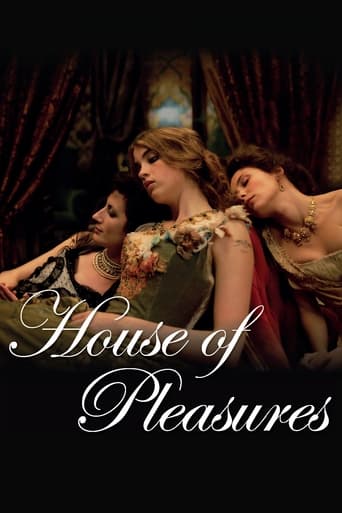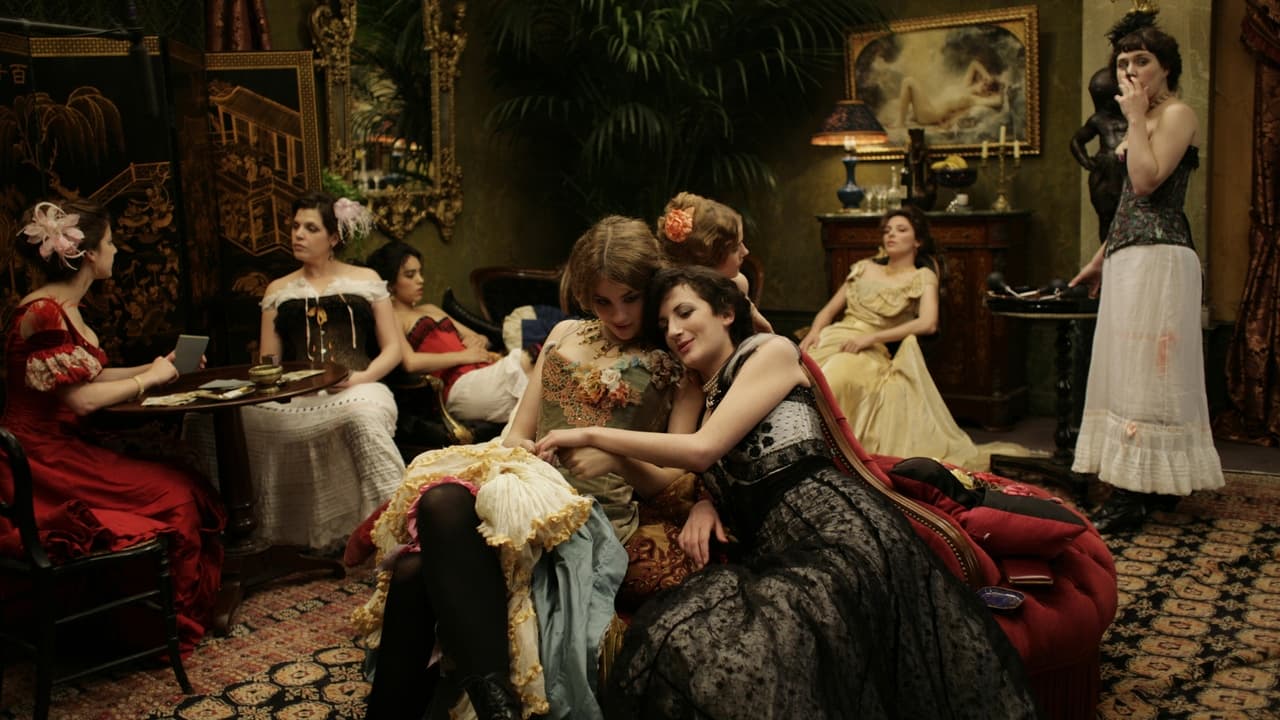runamokprods
This takes place in a Paris brothel just before and just after the start of the 20th century. While there is a lot of nudity and sex, the film is almost always anti-erotic, as it is so clear that the women are less than enthusiastic participants. Interestingly, I found the only moments with any erotic charge were moments between the women themselves, who support each other in what amounts to indentured servitude. Occasionally we feel the heat of human connection between them in a look, a touch, and that is far more sensual than anything they share with their clients, which is often degrading, and occasionally violent. The film is a look at the trap poor women found themselves in, when being a prostitute was one of the only ways to make your own money, and other professions had just as many drawbacks (one woman speaks of giving up being a washer-woman because her lungs were becoming damaged from breathing ammonia all day). But the irony is, the 'expenses' of being a well kept prostitute (from room and board to perfume) are more than the women can take in, so they inevitably fall deeper and deeper into debt. Like sharecroppers, they soon 'owe their soul to the company store'. This isn't a naturalistic film in the usual sense. It jumps around in time – something we sometimes only realize because we'll see a moment we'd watched earlier happen a second time, but in this case from a new perspective or in a new context. It's 'slow' by our usual standards, and is less about plot than about captured moments that build to something larger. It also uses anachronistic, modern music to great effect. But for all it's intentional artifice, there is a feeling of an honest sort of hyper-reality here. In the same way a poem can capture the feeling of a sunny day better than a lot of scientific explanation, so too does this poetic film capture a complex and sad world in a way that lets you feel a sense of understanding and empathy more than straight forward naturalism might. The film-making itself is of a very high order. The cinematography and acting are both first rate, and there is a sequence near the end that combined acting, images and music to give me chills in the rare way sequences by great film-makers can sometimes do. Not every choice works, but this is a bold, challenging and emotional film. It doesn't tell you what to think, it just creates a world, invites you inside and allows you to draw your own conclusions. I suspect I will get even more from it on a second viewing.
Vicki Hopkins
This movie is a graphically shocking film about prostitution in France in a mansion of tolerance. It's French ("L'Apollonide") with English sub-titles.Having researched heavily on this subject for one of my own works, I found it to be an eye-opening film. It's an intimate look behind the closed doors of a house of pleasure focusing on the lives of its mistress, prostitutes, and patrons.It covers such aspects as registering as prostitutes with the Bureau of Morales, being indebted to mistresses and unable to leave their employ because of it, champagne baths with customers, selection parlors, global fashions worn by prostitutes, opulent client bedrooms, and the regulated visits by the physician examining the workers every 15 days for sign of sexually transmitted disease.The movie contains naked women, sexually explicit scenes, and is not for the prudish or faint of heart. There are scenes of abuse of one of the girls, which may be disturbing to viewers. It delves honestly into the reality of life as a French prostitute, focusing on the sad and hopeless plight of women in brothels. The particular establishment depicted in this movie catered to aristocrats and rich businessmen, much like the Chabanais, which was one of the well-known brothels of its day.The movie is two hours, slow moving, and not the best flick you'll ever see. Most of the sexual scenes show the men enjoying their paid visits, while the women merely go through the motions void of emotion. As troubling as the scenes were, I found myself transported into the world I researched and came away shocked at seeing the reality portrayed on screen.Let's face it, being a prostitute wasn't glamorous. It was a profession that many poor and unskilled women chose in order to survive. It was a dangerous job where women died of syphilis, lived lives with no hope, and sold their bodies in order to eat and have housing. It portrayed a society that found pleasure in sex, living a way of life where brothels were an acceptable form of male entertainment until they were abolished in the early 20th century.If historical films interest you on all levels, I can attest that this one hits the mark in every way. Being a French film, it adequately portrays the heyday of legalized prostitution.
leoperu
It's hard to believe that no reviewer connects Bonello's (inferior) movie with the novel "Yama" ("The Pit") by the lesser - though still great - Russian realist Alexandr I. Kuprin ; even the "original" ending is pure Kuprin transferred to more distant future : times are getting worse, brothels closing, impoverished madams packing... soon the facade of the house changes completely, and all those girls named so and so run their own way lost in a big city, becoming a new kind of prostitutes : lonely street nomads .... Watching "L'Apollonide" I tried in vain to be entertained or swept by it, to like the "Nights in White Satin" gimmick, or the brutal visualizing of the " tears of sperm" metaphor, or the sequence of the mutilation structured a la Nichols'"Catch-22".
writers_reign
It's difficult to determine the target audience for this entry, if indeed there is one. There is one short scene involving full frontal nudity but this involves an applicant for a job in the brothel displaying her body for the madam so that there is no erotic content whatsoever. Elsewhere there are liberal helpings of naked breasts but again with a palpable lack of eroticism so we can rule out the dirty mac brigade. Bonello - who has something of a penchant for making films with a sexual content - Tiresia, The Pornographer - seems almost to be making a documentary recording life in a maison close during the years 1899-1900. This was, of course, the era known as the Belle Epoque but instead of rich, sumptuous colours, Bonello gives us muted, even drab colour photography and perversely shows us a girl with a tattoo - in 1899? - and introduces raucous rock music which clashes totally with the mood which verges on the serene - clearly Baz Luhrmann has a lot to answer for. With the exception of Moemie Chomsvsky, herself a gifted director and fine actress, as the madam, the cast is more or less unknown and appear to have been selected on the basis that they have (presumably) 19th century faces. By definition anyone who actually remembered the year 1899 would be around 120 today so there is no one to say Bonello hasn't got it right which still leaves the question, why bother.



 AD
AD



